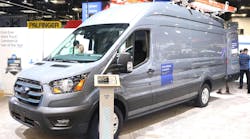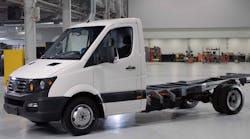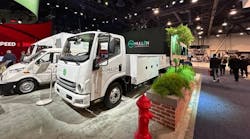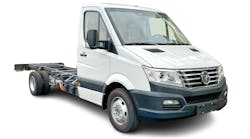A new brand of electric passenger vehicle could be on the horizon thanks to a potential partnership between Ford Motor Co. and one of China's growing automakers.
Ford announced this week it has signed a memorandum of understanding with Anhui Zotye Automobile Co., Ltd., a Chinese company once primarily manufacturing auto parts that in the last decade or so has been producing all-electric and other vehicles.
Ford called Zotye Auto "a pioneer in the Chinese all-electric vehicle segment" and "the market leader in China's all-electric small vehicle segment." Along those lines, Zotye Auto's E200 is a micro-compact, two-person electric urban car reminiscent of a Smart fortwo.
Zotye sold more than 16,000 all-electric vehicles through July this year, according to a release from the two companies, representing year-over-year growth of 56%.
The goal of the Ford-Zotye agreement is to explore a joint venture that would develop, produce, market and service a new line of all-electric passenger vehicles in China, but ripples from the deal and Ford's endeavors in the country could be felt elsewhere. Ford noted that China is the fastest-growing market in the world for "new energy vehicles" and that it expects the Chinese market for these vehicles to grow to 6 million units per year by 2025, with some 66% of those all-electrics.
"The potential to launch a new line of all-electric vehicles in the world's largest auto market is an exciting next step for Ford in China," said Peter Fleet, Ford group vice president and president of Ford Asia Pacific. Fleet added that EVs will be "a big part of the future" in the Chinese market, though they remain only a very small slice of the North American market for now.
Vehicles produced through the Ford-Zotye joint venture would be sold under a new brand — no hint yet at what that would be — aimed at capturing "a sizeable share" of China's EV market. The companies said they'll announce further details going forward, pending a final agreement and regulatory approvals.
The OEMs did specify that the joint venture would be "50:50," however. Ford called the planned partnership "a major step forward in building on Ford's electrification initiatives" that "will significantly expand Ford's footprint in China" along with Changan Ford and Jiangling Motors Corp., Ford's other joint ventures in the country.
Ford noted it has invested $4.5 billion to make electric vehicles as part of a "global electrification commitment." In that vein, the company said it plans to introduce 13 new electrified vehicles globally in the next five years, including an all-electric small SUV to be sold in Asia, North America and Europe.
Ford also recently announced an electrification strategy where 70% of all Ford vehicles sold in China will have electrified powertrain options by 2025. It's just another of the automaker's efforts to increase its emphasis on EVs around the globe; in Germany, for example, Ford has been working with Deutsche Post DHL Group to produce a larger-class electric delivery van based on the Transit chassis.
Other auto manufacturers — and indeed, nations including France and the United Kingdom, which have targeted 2040 for a ban on new gasoline- and diesel-engine vehicles — have announced goals for electric vehicles as well. Volvo, for one, has said all its new vehicles introduced from 2019 will include electric options, and it plans to have sold 1 million electric vehicles by 2025.








